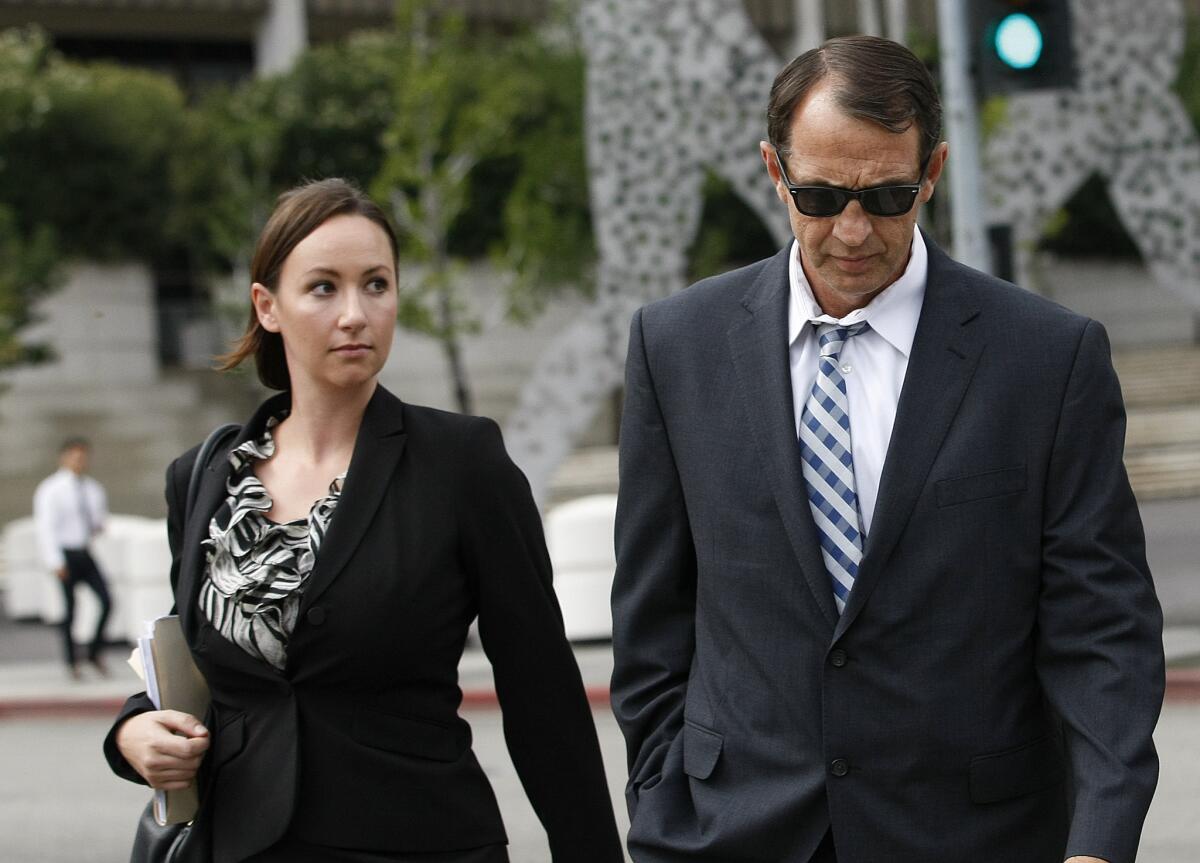Former L.A. sheriff’s captain pleads guilty in jail scandal

Retired L.A. County Sheriff’s Capt. William Thomas Carey leaves the Roybal federal courthouse in Los Angeles after appearing for an arraignment on May 14.
A retired high-ranking Los Angeles County sheriff’s official, who pleaded guilty Wednesday to lying under oath, is the latest to fall in a jail scandal that has resulted in several convictions for obstructing a federal investigation and using excessive force.
Former Capt. William “Tom” Carey entered his plea in a downtown courtroom, admitting to a single charge of lying during his testimony at a trial last year of a sheriff’s deputy who faced obstruction charges.
Under the terms of a plea agreement filed in U.S. District Court, prosecutors said they would drop three other counts against Carey and seek leniency for him. In exchange, Carey is expected to cooperate with federal authorities as they go after Paul Tanaka, once the second-highest-ranking official in the Sheriff’s Department.
The former captain and his attorney declined to comment after Wednesday afternoon’s hearing.
Carey and Tanaka were indicted in May on several counts of wrongdoing in which they were accused of taking part in a scheme to thwart a federal investigation into the use of excessive force and corruption in the network of jails operated by the department.
Wednesday’s plea stemmed from Carey’s testimony at the trial of former Deputy James Sexton, who was found guilty. The case against the deputy centered largely on efforts by him and other sheriff’s officials to conceal the whereabouts of an inmate after discovering he was working as an informant for the FBI.
Six other sheriff’s officials also were convicted of obstruction in a separate trial.
The deputies argued during the trials that they were not trying to interfere with the FBI’s investigation but moved the inmate to keep him safe from other inmates and deputies.
While on the stand at Sexton’s trial, Carey was asked by a prosecutor whether there was “any other reason to move [the inmate] ... other than his safety.”
“No,” Carey responded.
According to the plea agreement, this was a lie because Carey knew that the actions were also designed “so that the FBI could not have access to [the] inmate” without the permission of Tanaka or another top sheriff’s official.
Tanaka has pleaded not guilty.
Tanaka’s attorney, H. Dean Steward, conceded in an interview last week that Carey’s decision to strike a deal and cooperate with prosecutors complicates matters for his client.
But Steward said he doesn’t expect the former captain will be called to testify against Tanaka at trial.
“Once you’ve admitted to lying on the stand, who can believe anything you say?” Steward said.
Allegations contained in the written plea agreement that Tanaka was present at certain meetings and gave orders to others regarding what to do with the FBI’s inmate informant were inaccurate, Steward said.
Steward said he had not discussed a plea deal with prosecutors and would not accept one if it were offered.
“Our client has done nothing wrong,” he said.
Steward said he thinks prosecutors flipped Carey as part of an effort to build a case against Tanaka’s boss, former Sheriff Lee Baca.
Baca has not been charged. Court testimony has placed him at some of the meetings where sheriff’s officials discussed moving the inmate informant around the jails and confronting an FBI agent at her home.
Asst. U.S. Atty. Brandon Fox, lead prosecutor in the obstruction cases, declined to comment on the possibility that Baca would be indicted.
Reached by phone last week, Baca also declined to comment. “It would be inappropriate for me to weigh in,” he said.
Carey’s plea agreement included a narrative of events that describes meetings Carey attended with Tanaka and others.
At a meeting on Aug. 23, 2011, Tanaka gave approval for Carey and others to move the inmate informant, Anthony Brown, out of Men’s Central Jail, in part to ensure that Brown would not have further contact with the FBI, the document said.
And Carey, who at the time was the head of the Internal Criminal Investigations Bureau, authorized deputies to conduct surveillance of an FBI agent and later met with Tanaka and others to discuss approaching the agent outside her home, the document said.
Because Carey has no criminal record, federal guidelines call for a maximum sentence of 15 to 21 months, said Laurie Levenson, a professor at Loyola Law School and a former federal prosecutor.
However, as part of the deal, prosecutors will suggest to U.S. Judge Percy Anderson that Carey receive credit for “acceptance of responsibility.” He could end up with a sentence of home detention and almost no prison time, Levenson said.
Having Carey share what he knows and being available to testify gives prosecutors more ammunition against Tanaka but does not necessarily mean they intend to go after Baca, Levenson said. Still, Carey’s knowledge of high-level deliberations could be cause for concern for both his former bosses, she said.
“It’s got to make both Tanaka and Baca nervous,” Levenson said. “Now you have someone from the higher echelons who can tell prosecutors what was happening and what people at the top did or should have done.”
Carey is scheduled to be sentenced in January.
For more federal court news in Los Angeles, follow @joelrubin
ALSO:
Massive Rocky fire was sparked by faulty water heater, investigators say
Another outbreak from tainted scopes is suspected at a Southland hospital
Steve Lopez: Pizza maker burns time and dough on red tape
More to Read
Sign up for Essential California
The most important California stories and recommendations in your inbox every morning.
You may occasionally receive promotional content from the Los Angeles Times.











